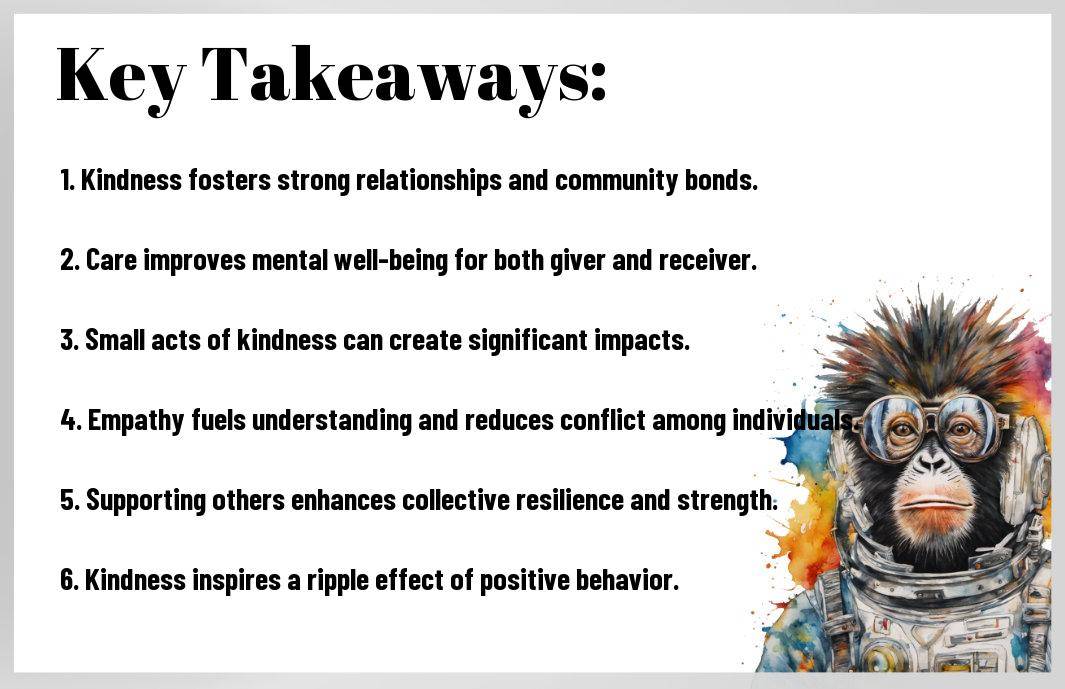Humanity thrives on the foundation of compassion and kindness. In our interconnected world, the way we treat one another significantly impacts our communities and society as a whole. When I choose to care for others, I not only improve their lives but also enhance my own sense of purpose and well-being. To cultivate a kinder world, it’s necessary that you recognize the power of simple acts—showing kindness can transform lives. Join me as we explore how prioritizing care for others can lead to profound positive changes in ourselves and the world around us.
Key Takeaways:
- Empathy fosters stronger relationships and understanding among individuals.
- Acts of kindness can have a ripple effect, inspiring others to be compassionate.
- Volunteering time and resources enhances community bonds and personal fulfillment.
- Listening to others demonstrates respect and shows that you value their feelings.
- Diversity and inclusion in kindness can create a more harmonious society.
- Small gestures of care can significantly uplift someone’s day or mood.
- Awareness of the struggles faced by others encourages a supportive environment.


The Importance of Kindness
For many, kindness serves as the foundation of humanity. It is a powerful force that can transform lives, fostering a compassionate society where individuals feel valued and understood. When we show kindness to others, we not only uplift them but also contribute to a culture of empathy, encouraging positive interactions that can lead to lasting relationships. By embracing kindness, we pave the way for a brighter future, where the well-being of every individual is prioritized.
Psychological Benefits
For those who practice kindness, the psychological benefits can be profound. Engaging in acts of kindness can lead to improved mental health by reducing stress, anxiety, and feelings of loneliness. Not only does it foster a sense of purpose, but it also enhances your mood and boosts self-esteem. By prioritizing kindness, you create a cycle of positivity that benefits not only yourself but also the individuals around you.
Social Impact
At its core, kindness has a significant social impact, shaping communities and influencing social dynamics. When individuals engage in kind acts, they contribute to a culture of mutual respect and support, encouraging others to follow suit. This creates a chain reaction that can result in stronger, more resilient communities, where people feel connected and empowered. Your simple acts of kindness can inspire others and foster a sense of belonging, leading to an overall enhancement of social cohesion.
It is vital to understand that kindness can lead to both short-term and long-term positive changes within communities. When you exhibit kindness, you promote a culture where individuals feel valued and respected, creating an opportunity for stronger social bonds and collaboration. This interdependence enhances the overall well-being of society, as people come together to support one another during challenging times. Ultimately, embracing kindness in our daily interactions not only enriches your life but also contributes to a healthier, more united world.
Caring for Others: Key Principles
Now, I believe that true compassion starts with understanding the needs and feelings of those around you. By fostering an environment where kindness prevails, we can collectively uplift one another. Caring for others is rooted in empathy, active listening, and genuine connection, forming the foundation of a supportive community. It’s important to recognize that our actions can significantly impact the lives of others, promoting an atmosphere of trust and respect.
Empathy and Understanding
By embracing empathy, I can connect with others on a deeper level, allowing me to understand their experiences, emotions, and perspectives. This connection fosters a sense of trust and respect, making it easier for you to offer meaningful support to those in need.
Active Listening
Against the noise of daily distractions, I make a conscious effort to engage in active listening. This means giving full attention to the speaker, validating their feelings, and responding thoughtfully. When you practice active listening, it not only strengthens your relationships but also encourages open communication and deeper connections.
At the heart of active listening lies the commitment to truly comprehend what someone is expressing. I focus on eliminating distractions and maintaining eye contact, which shows respect and interest in their words. By asking open-ended questions, I encourage them to elaborate on their thoughts and feelings, fostering an environment of honesty and openness. This engagement allows you to respond in a way that demonstrates understanding and compassion. Ultimately, active listening cultivates profound connections, enriching your relationships and building a supportive community.
Ways to Show Kindness Daily
Keep in mind that kindness can manifest in countless simple ways throughout your day. A smile, a compliment, or a helping hand can brighten someone’s day and create a ripple effect of positivity in your interactions. Make it a habit to engage in small gestures that encourage connection and warmth, showing others that you genuinely care.
Small Acts of Kindness
Any small act of kindness can make a significant difference in someone’s life. Whether it’s holding the door for a stranger, paying for a colleague’s coffee, or leaving an encouraging note for a friend, these little gestures can uplift spirits and foster a sense of community. Consistently practicing these acts can create a more compassionate environment around you.
Volunteering and Community Service
To truly embrace kindness, I find that volunteering can be one of the most rewarding experiences. It not only helps those in need but also enriches my own life and brings me closer to my community.
But volunteering and community service go beyond just giving your time; they allow you to make a lasting impact on the lives of others. Serving food at a shelter, mentoring youth, or helping at a community garden can foster deep connections with people who might otherwise feel isolated. Additionally, by dedicating time to these causes, you foster a spirit of collaboration and support in your community. Engaging in such activities not only benefits others, but they also enhance your own mental health and fulfill your desire to contribute positively to the world around you.

Overcoming Barriers to Kindness
Once again, we find ourselves confronting the challenges that hinder our ability to be kind. It’s important to recognize that barriers can stem from various sources, yet they don’t have to define our actions. By participating in initiatives like HUMANITY, I can contribute to fostering a culture of kindness that transcends these limitations.
Societal Challenges
With societal pressures, cultural norms, and systemic issues often dictating human interactions, kindness can seem like a luxury rather than a necessity. It is vital for us to challenge and change those narratives that cultivate division. We must embrace dialogue and collaboration to create a more compassionate society.
Personal Obstacles
Across my personal experiences, I’ve encountered obstacles that can impede a kind demeanor, including stress, fear, or a busy lifestyle. These factors can cloud our judgment and reduce our capacity for empathy, but they do not have to control our actions.
Also, I find that when I am caught up in my daily life, things like stress and fear can create a defensive mindset. Amidst these challenges, it’s easy to overlook the small gestures of kindness that can make a significant impact. I know that taking a moment to breathe, appreciate my surroundings, or consider another person’s perspective can dissolve those barriers. Finding my own balance helps me remain open to others, allowing for authentic connections and genuine acts of compassion in my life.
The Ripple Effect of Kindness
Your kind acts can create a ripple effect that influences those around you, encouraging them to pay it forward. By showing kindness, you empower others to spread positivity, ultimately transforming workplaces and communities. For effective teamwork, consider tools like Online Employee Scheduling Software | Workforce Management to help create an environment that fosters collaboration and support.
Inspiring Others
Against the backdrop of negativity, your kindness can shine brightly, inspiring those around you to change their behaviors and spread compassion. When I witness acts of kindness, I feel motivated to contribute positively, highlighting how simple gestures can cultivate an uplifting atmosphere.
Creating a Positive Environment
The act of showing kindness not only affects individuals but can also transform entire environments. Kindness leads to increased collaboration and morale, ultimately enhancing productivity and well-being. By prioritizing a culture of compassion, I create a space where everyone feels valued, resulting in stronger relationships and a united community.
Further, when I embrace kindness, I help to cultivate an environment in which trust and respect flourish. This positive atmosphere is vital to reducing conflict and enhancing team dynamics. Employees are more likely to engage and contribute, leading to heightened creativity and problem-solving. In turn, this fosters a culture of support, where individuals feel empowered to make a difference, creating a cycle of positivity that can change the trajectory of any group.
Kindness in Different Cultures
Despite the vast diversity among cultures, the fundamental principle of kindness resonates universally. Each culture has its unique approach to showing care and compassion, shaped by history, beliefs, and values. From simple gestures of goodwill to elaborate ceremonies of support, understanding these variations enriches my appreciation for humanity’s capacity for kindness. It’s fascinating to see how these practices manifest differently while sharing the same underlying intent of nurturing human connections.
Global Perspectives
Cultures around the world express kindness in myriad ways, influenced by their societal norms and values. From the communal support systems in Indigenous cultures to the respect for elders in Asian societies, the perspectives on kindness can vary widely. Each culture’s interpretation of kindness not only fosters a sense of belonging but also promotes harmonious relationships within communities.
Traditional Practices
Global traditions often showcase unique ways of promoting kindness through rituals and communal activities. These practices are not only about individual gestures but also tied deeply to collective memories and identities. They reflect the myriad ways humans bond through empathy and solidarity.
It is crucial to explore how traditional practices shape communal kindness across different societies. For instance, African Ubuntu philosophy emphasizes that ‘I am because we are,’ highlighting the significance of community welfare. In contrast, Japanese Omotenashi focuses on hospitality as a deeply ingrained tradition, showcasing respect and personal care for others. Such practices can create profound connections and foster a sense of belonging, illustrating how cultural customs can effectively demonstrate the power of kindness. Understanding these traditions can inspire us to cultivate our own practices of compassion.
Conclusion
To wrap up, I believe that caring for others and showing kindness forms the backbone of our shared humanity. Each small act of compassion can create ripples of positivity, impacting not only those around you but also fostering a more connected community. By embracing empathy and kindness in our daily lives, you can contribute to a world that thrives on mutual respect and understanding. Let’s make it a priority to uplift each other, as together we can create a more harmonious existence.
FAQ
Q: Why is caring for others important in humanity?
A: Caring for others fosters a sense of community and belonging. When we show kindness, we encourage a supportive environment that allows individuals to thrive and feel valued. It promotes empathy and understanding, which can lead to stronger social connections and more harmonious living conditions.
Q: How can someone show kindness in their daily life?
A: Kindness can be demonstrated in various ways, including simple gestures like holding the door open for someone, offering a genuine compliment, or helping a neighbor with their groceries. Acts of kindness can also extend to volunteering, providing emotional support to friends in need, or even sharing knowledge and skills to assist others in their personal or professional growth.
Q: What are the effects of kindness on mental health?
A: Engaging in acts of kindness can significantly enhance one’s mental well-being. It often leads to feelings of happiness and fulfillment, reduces stress, and can even improve one’s self-esteem. Kindness promotes a positive mood and encourages a mindset focused on gratitude and compassion, beneficial for both the giver and the recipient.
Q: Can kindness be taught or is it an inherent trait?
A: Kindness can certainly be cultivated and encouraged through education and positive role modeling. While some individuals may naturally exhibit more kindness, environments that prioritize empathy, compassion, and altruistic behaviors can reinforce these traits in everyone, making kindness an acquired skill as much as an inherent one.
Q: What role does kindness play in conflict resolution?
A: Kindness can be a powerful tool in resolving conflicts, as it encourages open communication and promotes understanding. Approaching disagreements with empathy can diminish hostility and pave the way for constructive dialogue. By acknowledging the feelings and perspectives of others, we can find common ground and work towards mutually beneficial solutions.
Q: How does kindness towards others influence societal change?
A: Collective acts of kindness can lead to significant societal transformations. When individuals commit to caring for one another, it can inspire a ripple effect, prompting communities to support social justice, address inequalities, and create more inclusive environments. This collective compassion can drive change and foster a more equitable society for all.
Q: What are some ways to encourage kindness in children?
A: Encouraging kindness in children can be achieved through modeling behavior, discussing the importance of empathy, and providing opportunities for them to practice. Engaging in community service, reading books that emphasize kind actions, and offering praise for moments of kindness can help instill these values. Encouraging siblings and peers to treat each other with respect and understanding also lays a foundation for compassionate behavior as they grow.



